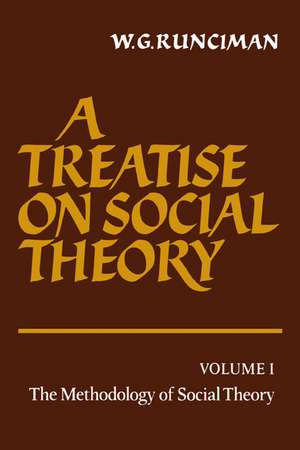A Treatise on Social Theory: A Treatise on Social Theory 3 Volume Paperback Set
Autor W. G. Runcimanen Limba Engleză Paperback – 2 mar 1983
| Toate formatele și edițiile | Preț | Express |
|---|---|---|
| Paperback (2) | 353.87 lei 43-57 zile | |
| Cambridge University Press – 2 mar 1983 | 353.87 lei 43-57 zile | |
| Cambridge University Press – feb 1989 | 424.65 lei 43-57 zile |
Preț: 353.87 lei
Nou
Puncte Express: 531
Preț estimativ în valută:
67.73€ • 69.80$ • 57.18£
67.73€ • 69.80$ • 57.18£
Carte tipărită la comandă
Livrare economică 03-17 martie
Preluare comenzi: 021 569.72.76
Specificații
ISBN-13: 9780521272513
ISBN-10: 0521272513
Pagini: 364
Dimensiuni: 152 x 228 x 22 mm
Greutate: 0.53 kg
Editura: Cambridge University Press
Colecția Cambridge University Press
Seria A Treatise on Social Theory 3 Volume Paperback Set
Locul publicării:Cambridge, United Kingdom
ISBN-10: 0521272513
Pagini: 364
Dimensiuni: 152 x 228 x 22 mm
Greutate: 0.53 kg
Editura: Cambridge University Press
Colecția Cambridge University Press
Seria A Treatise on Social Theory 3 Volume Paperback Set
Locul publicării:Cambridge, United Kingdom
Cuprins
Preface; Part I. Introduction: The Nature of Social Theory: 1. Social theory as science; 2. The concept of understanding; 3. Analysis of actions; 4. Two kinds of value-judgement; 5. The problem of reflexivity; 6. Conclusion; Part II. Reportage in Social Theory: 7. The practice of primary understanding; 8. The choice of terms; 9. The bounds of reportage; 10. Sub-types and variants; 11. Definition and classification; 12. Inference within reportage; 13. Conclusion; Part III. Explanation in Social Theory: 14. Theory-making and secondary understanding; 15. The grounding of hypotheses; 16. Interpreting weak but adequate theories; 17. Varieties of causes; 18. Goals, functions and evolution; 19. Conclusion; Part IV. Description in Social Theory: 20. Tertiary understanding; 21. Authenticity and its opposites; 22. Putting descriptions across; 23. The uses of analogy and detail; 24. Conceptualization and narration; 25. The relation of description to evaluation; 26. How good can descriptions hope to be? 27. Conclusion; Part V. Evaluation in Social Theory: 28. The inescapability of evaluation; 29. Benevolence as a presupposition; 30. forms of misevaluation; 31. Appealing to the 'facts'; 32. Evaluation without pre-emption; 33. Theory-neutral uses of evaluative terms; 34. Conclusion; Index.
Descriere
This first volume of a trilogy on social theory sets out the criteria by which the work of social scientists require to be tested.
Recenzii
'This is a masterpiece: in its scope and its command of historical and ethnographic detail, it is reminiscent of Economy and Society; in its systematization more gripping.' David Lockwood
'It is an astonishing bravura performance … I have not come across another approach to comparative history which has impressed me so much.' Eric Hobsbawm
'This is an important and remarkable book. It is extremely ambitious offering nothing less than a general theory of human society, and the confrontation of that theory with the historical material. The quality of the material is commensurate with the ambition.' Ernest Gellner
'It is an astonishing bravura performance … I have not come across another approach to comparative history which has impressed me so much.' Eric Hobsbawm
'This is an important and remarkable book. It is extremely ambitious offering nothing less than a general theory of human society, and the confrontation of that theory with the historical material. The quality of the material is commensurate with the ambition.' Ernest Gellner
















